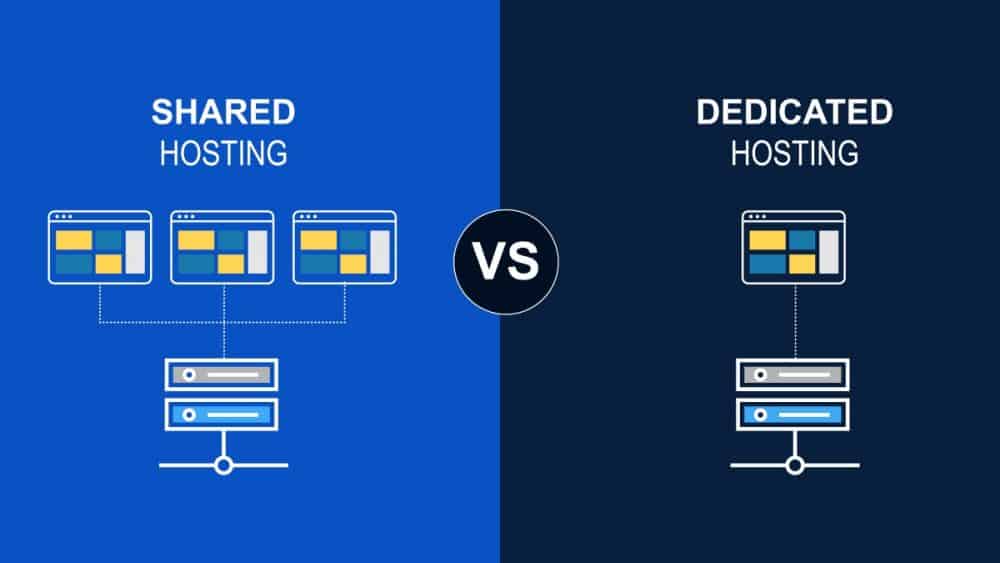All providers claim to offer unlimited scalability, but is this really the case? It is hard to tell the differences between shared hosting and dedicated hosting in today’s market. Mid-sized companies, in particular, need to make difficult decisions. This article will look at both options, and explain the critical difference between dedicated and shared web hosting.
This article considers both options, learn the critical difference between dedicated and shared web hosting.
What is Shared Hosting?
As the name implies, shared hosting means you are sharing a physical server with other tenants. This includes hard drive, CPU, memory, and bandwidth. Each tenant can access their own virtual environment because the hypervisor layer separates the server. The provider manages your environment and you have limited customization. It is a more affordable option compared to dedicated hosting.Below are some of the key characteristics of shared hosting.
Limited Hosting Resources
No matter what providers say, shared hosting always provides limited hosting resources. Scaling up can be a challenge with shared hosting. Each small or medium business wants to grow. The IT resources of small and medium-sized businesses should support or at least be in line with this growth. It depends on the type of business you run and your individual needs. In general, shared hosting can only be upgraded to increase bandwidth and storage. Note: Scalability is the room to expand your resources, such as bandwidth, drive space, processing power, etc. Scalability is the ability to install customized software. Scalability provides room to accommodate for different use cases.
Latency
Shared hosting involves multiple virtualized environments, so it is more prone to suffer from high latency. A hypervisor layer is present between your virtualized environment and the server. This means that your software isn’t directly connected to hardware. You can expect higher latency as a result. Higher latency can also be caused by performance bottlenecks that are more common in shared environments. Note: Computer latency is the delay between a command being run and the desired output. In ordinary everyday operations, computer latency is more popularly called “lag.”
Limited Customization Options
As noted above, it is the provider who manages shared environments. Customization options are therefore limited. It is difficult to adapt the initial configuration for changes in IT business needs. Not to mention that you are not always sure which hardware components are really below all the virtualization layers.
Server Optimization
If your online app or website is running slow, you have fewer options to optimize the environment. Shared plans don’t provide enough access for server-level optimization and speed. It depends on the use case. Most small businesses don’t mind not having to work on server optimization.
Quick Deployment and Migration
Virtualized environments are great for rapid deployments. Virtual environments can be up and running in an hour. Virtual environments are a great way to test and develop online applications. Additionally, migrating data is often easier when working with virtual machines.
Shared Hosting is Cheaper
It may come with several limitations, but shared hosting is the most affordable option. Multiple tenants sharing a physical server reduces the cost for each individual user. You don’t need your own IT team to manage the environment. Shared hosting is a great option for companies that don’t have the expertise or resources to manage dedicated servers. You may end up sharing your IP address with another tenant if you use shared hosting. This division could be problematic. The authorities may blacklist your IP address if another tenant performs prohibited actions. If, for example, several tenants are using a shared address to deliver mass emails, this action can flag your IP.
Note:
Some custom environment setups might require a unique IP address.Less ResponsibilityYou may get less access and customization options with shared hosting, but you also have less responsibility. The provider is responsible to maintain and ensure uptime. The IT provider must provide 24/7 support. The tenant needs only limited technical knowledge.
What is Dedicated Hosting
With dedicated hosting, a single-tenant organization has exclusive access rights to a dedicated physical server. Its superiority is due to the fact that dedicated solutions do not share resources. All server resources and customization options are at your fingertips. Organizations have the option to set up dedicated servers on-premises, collocate them in data centers, or rent.

On-premises:
Hosting on-site is the most expensive option. Hosting a server in-house requires highly skilled IT staff. The configuration must be chosen, hardware purchased, the server set up, and a high bandwidth network configured. Upfront costs are high, and network connectivity is often limited.
- Colocation: Colocation is a great option if you need excellent network connectivity, but want to own the equipment. Renting server racks is a great option if you need excellent network connectivity but want to own the equipment. This option requires that you have an IT staff to manage the server. For this option, you need knowledgeable IT staff to manage the server.
- Rent: This is the most affordable dedicated server hosting type. The service provider will deploy the configuration you choose. Rent the equipment instead of owning it. Hardware malfunctions are handled by the provider, so there is no need for high-level IT staff. Renting organizations do not need to have highly-trained IT staff. You can choose the hardware and configure the software according to your needs. Below are some of the main characteristics of dedicated hosting.
- Stability and PerformanceYou are not sharing the hardware, so there is no neighbor whose rogue script may affect the stability of your hosting environment. Exclusive control is a deciding factor in many organizations. Dedicated hosting is the best choice for web apps that require stable environments and are often customized. You always get what your pay for when it comes to performance. You have access to all resources at any time. Whether you opt for a state-of-the-art machine or an affordable low-spec server is up to your budget and use case.
Custom Hosting Environments
From hardware to software, dedicated hosting environments are fully customizable. Hardware components can be selected by organizations. Software can be configured to suit your needs. You can install a hypervisor to create your own cloud. The sky’s the limit in this case. However, even minor customization requires IT expertise. Whether that is something your organization has in-house is an essential factor when deciding on a platform.
Security & Scalability
Dedicated hosting often comes with precisely configured DDoS protection IP address blocking, and other server-level security features. With dedicated hosting, RAID configurations are available. This adds yet another layer to redundancy. This ensures that you can recover your data from different locations. Dedicated hosting does not have other tenants who may misuse the server and create security gaps. Scalability is one of the main benefits of dedicated servers. If you choose your hosting configuration carefully, the potential for growth is enormous. This will help you avoid any downtime caused by server limitations. That is essential if you are running a software-as-a-service (SaaS) application.Slower DeploymentDeploying a dedicated server is quite complicated. The provider must procure the parts, create the configuration and install the server in the datacenter. Custom hardware and software configurations can take several days. Planning for the needs of a growing business is crucial. Carefully planning for the needs of a growing business is crucial.
Dedicated Hosting Costs
Dedicated hosting may cost up to 15 times more than simple shared solutions. The price of dedicated hosting is justified when you consider the advanced features it offers. What is a Virtual Private Server? Virtual private servers are offered by providers as non-shared cloud resources. VPS is the perfect balance between shared hosting and dedicated hosting. In practice, resources are shared but there are clear boundaries between tenants. In this setup, the physical server is only shared by a few tenants. Each instance is allocated a strict amount of resources. Each VPS is an independent server. So, the resources are more accessible than with any other shared hosting option. Shared hosting is superior in terms of performance, stability, and security. Raw computing power is not as high as dedicated hosting. A VPS also offers root access. You have more customization choices. This goes hand-in-hand with the requirement for managed services or dedicated IT staff. It is also less expensive than a dedicated server. That is because the cost of all resources and maintenance is ‘shared’ among several tenants.
Key Differences between Shared Hosting, VPS and Dedicated Hosting
Shared Hosting
Virtual Private Server

Dedicated Hosting
Suitable for
Websites
| Applications, complex and highly visited websites | SaaS, large scale applications | Costs | |
| Low | Mid to high | Very high | Managed by |
| Hosting provider | End-user staff or hosting provider | In most cases by end-user staff | Security |
| Low to medium | High | Very high | Performance |
| Low | Medium to high | Very high | Bandwidth |
| Low | Medium to high | Very high | Scalability |
| Limited | Medium to high | Very high | Note |
| Good choice for rapid deployments or if you are dealing with a limited budget. | More bandwidth and better performance than shared hosting, but for a higher price. Flexibility of dedicated hosting for a lower price. | Complete control and ultimate performance…for the ultimate price. The only choice when performance and security are key to an organization’s success. | Making an Informed Decision – Use Cases |
| Planning is key. Think about your long-term objectives before you sign any contract. What do you envision your company in three to five years? What are your IT needs, both internal and external? Answers will vary from business to business. If you run a small ecommerce shop or website that has less than six figures in traffic, then | shared hosting is the best option. You do not need root access to make the customizations you require, nor do you need dedicated hosting. You don’t need a dedicated hosting option if you have a small amount of traffic and need fewer resources. The only reason why you would want to opt for dedicated hosting or | VPS | is if you expect a sharp rise in traffic in the foreseeable future. |
Hosting a Software-as-a-Service
Your business provides subscription software to a wide range of users. Your business must have a service that is always online with the least amount of downtime possible. The number of users will determine how much resource you need. Platforms need to be flexible and adaptable to your future releases. You will also be dealing with user data as a SaaS service provider. Select a service provider that is PCI DSS 2.0 validated.
Dedicated hosting
is the best option for this use case. Hosting health data is the most suitable option in this case. You need to comply with HIPAA regulations when storing, transmitting, and collecting medical data. You can choose between dedicated cloud hosting and very safe cloud hosting. Some providers specialize in HIPAA compliant hosting, so there is an entire slew of options.
Video Streaming and Gaming Service
Bandwidth and performance are very important for your business. You can expect traffic up to 10 Gbps. A millisecond of delay can make the difference between a customer who is satisfied and one who will not use your service. Slow response times, poor streaming and lag will harm your reputation and sales. You need to be in a highly competitive market, so you will require a dedicated hosting solution that can power your service. There are dedicated streaming media servers available from providers. Those are highly scalable, secure and reliable platforms for media hosting and streaming.Large e-Commerce ShopDowntime is the last thing an online merchant needs. Uptime guarantees, optimization of your site, and security are all important to you. The load times need to be lightning fast, while dynamic content and custom chat support are often required.
Dedicated Hosting
ensures that you have a highly customizable and stable platform for your business online. Shared hosting does not exist. If you want to opt for a cloud solution, choose a VPS or a Managed Private Cloud.
Hosting Service
As a hosting provider, the more resources you can get the better. Shared hosting is not an option if you have clients who ask you to host their websites. You will need a VPS or dedicated Hosting
. You need easy scalability, system stability and confidence in the underlying infrastructure.
Pros and Cons of Shared vs Dedicated HostingProsConsShared HostingLow costs.Good choice for fast deployments.Good choice where you have no IT support staff.
Hardware is shared between multiple virtual instances.
System stability depends on the vulnerability of each tenant’s environment.Very low scalability.Low bandwidth.Virtual Private ServerComplete control over the hosting environment.
Overall better performance than shared hosting.
| Costs are significantly higher than for shared hosting. | Dedicated Hosting | |
| You have complete control over your server. | Highly scalable solution. You need in-house tech staff to keep it running. High costs. You have complete control over your server. |
